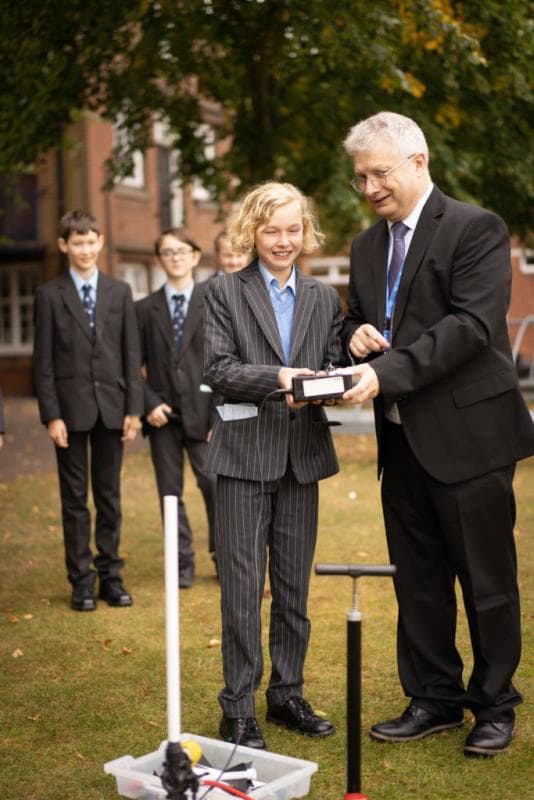Helping pupils to understand how everything works, giving answers to the biggest questions and having them backed up by solid evidence.

Physics helps students to understand how everything works, giving answers to the biggest questions and having them backed up by solid evidence. They learn how to carry out experiments, using Maths as a toolkit for analysis and English for communicating ideas and findings fluently. The Physics Department strongly believes in the value of active participation to aid learning and this underpins our teaching at every level. Practical work is at the core of our teaching.
Lower School
The curriculum offers a broad coverage of materials to provide interest and a thorough preparation for the GCSE. Topics include measurement, energy, electricity, space, forces, magnetism, light, sound and speed. In Year 7 Physics is taught as part of the Principles of Science course, which integrates Physics, Biology and Chemistry, and in Year 8 it is taught as a single subject.
Middle School and GCSE
We follow the AQA specification as this offers a good degree of rigor with a breadth of subject knowledge that prepares pupils well for study at A level. Two Physics clinics are offered every week, with additional support for those who are recognised as needing it through regular exam practice.
Sixth Form
At Ipswich School we follow the OCR-A Physics specification at A Level. This course begins by giving students a solid grounding in the fundamental skills associated with Quantities, Units and Measurements. Year 12 students then complete work on Forces and Motion, Materials, Electricity, Waves and Quantum Physics. Year 13 begins with Gas Laws, Circular Motion, Oscillation, Gravity and Cosmology. The course is completed with topics on Capacitance, Fields, Particle Physics, Radioactivity, Nuclear Physics and Medical Imaging.
Alongside this material, students will be assessed on their ability to complete a series of standard practical tasks. Lessons typically involve the introduction of new concepts through delivery of theory and discussion with students. Links to prior knowledge are important to establish at all points as so much of Physics is about building up the complete picture of understanding.
Often learning is reinforced through the use of practical work and demonstrations. In the Sixth Form students have the opportunity to use more advanced equipment. The department runs two clinics per week and these are used to support students who have questions with subject knowledge. We also actively intervene to help those students whose GCSE grades indicate that they may find the transition to A Level more difficult. These students are required to attend clinic and their attendance is registered.
To be successful at A Level Physics, you are strongly advised to take A Level Maths as well.
The Physics Department makes a great effort to offer a rich variety of activities beyond the curriculum. Sixth Formers have the chance to participate in our many trips to lectures either in Ipswich or at the Cavendish Laboratories in Cambridge. Year 12 students have the opportunity to visit the Diamond Light Synchrotron in Oxfordshire. Year 13 students can join us for a day trip to the Large Hadron Collider (CERN) in Geneva. Students are also encouraged to help out with other Physics events so that they can enthuse younger pupils and also to enhance their own university applications, for example helping to run the LEGO Robotics club, assisting with outreach events such as PhysicsFest and Science Activity days here at Ipswich School.
Exam results
The average of the results in Physics over the most recent three year period (2024, 2023, 2022) is:
| GCSE | |
| 9 | 25% |
| 9-8 | 48% |
| 9-7 | 70% |
| 9-4 | 100% |
| A Level | |
| A* | 22% |
| A* – A | 48% |
| A* – B | 70% |
